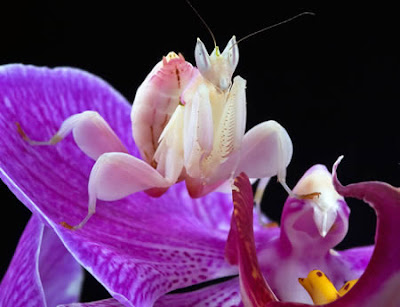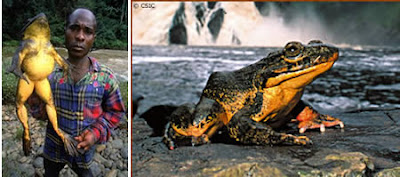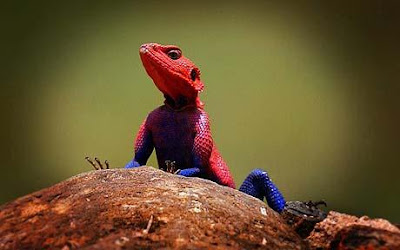Freaky Tree Climbing Goats


These tree climbing goats can be found in Morocco. They only climb these specific trees to eat argan fruit which is like an olive. Farmers often follow these herds of goats to collect nuts which they spit out and make argan oil out of them. Argan oil is used in cooking and cosmetics.

Freaky Tree Climbing Goats

Strange Two-Headed Turtle

This strange creature used to be a mascot for an animal shelter in New York, before it was stolen only a few days earlier of being featured in the local newspapers.

Strange Two-Headed Turtle

Freaky Vegetarian Spider

Bagheera Kiplingi, a South American species, eats leaf buds and is thought to be the only non-carnivorous spider out of about 40,000 species. Its diet includes nutritious wild acacia plants and it has no need to spin a web to catch preys.

Freaky Vegetarian Spider

Smallest Horse in the World
This little horse named Thumbelina was born to Paul and Kay Goessling, who specialize in breeding miniature horses. But even for the breed, Thumbelina is particularly small: she is thought to be a dwarf-version of the breed. At just 60 lb and 17-inch tall, she is the world’s smallest horse.

Smallest Horse in the World

Freaky Giant Camel Spider

The story of the Giant Camel Spider (Arachnid Solifugae) is told by the United States Servicemen in the Persian Gulf War and afterwards from the Iraq War. It was said that a giant camel spider crawled into the sleeping bag of a soldier, biting the man while he was asleep. Fortunately, the giant desert camel spiders native to Iraq aren't venomous. It uses its claws to catch its prey, which is never bigger than the arachnid itself.

Freaky Giant Camel Spider

Freaky Orchid Mantis

The Orchid Mantis (Hymenopus Coronatu), is a variety of flower mantis usually found in Indonesia and Malaysia. The unique bug camouflages itself in orchid flowers, waiting for other delicious bugs to prey on.

Freaky Orchid Mantis

Freaky Transparent Frog


The Glass Frog or Crystal Frog (Hyalinobatrachium Pellucidum) is called such because you can see through its transparent flesh (including its guts). This frog is endangered, so this finding is heartening for environmentalists.
From Wikipedia:
Hyalinobatrachium pellucidum, also known as the glass frog or see-through frog is a species of frog in the Centrolenidae family. The frog is named for its skin which is translucent to the point that internal organs and surfaces immediately behind the frog can be seen. It is endemic to Ecuador. Its natural habitats are subtropical or tropical moist mountains and rivers. It is threatened mostly by habitat loss, although conservation programs have begun to help save this interesting creature. This frog is about the size of a fingernail.

Freaky Transparent Frog

Largest Frog in the World

The Goliath Frog (Conraua Goliath) is the largest species of frog on Earth. It can grow up to 13 inches (33 cm) in length, and weighs up to 8 lb (3 kg). This animal has a relatively small habitat range, mainly in West Africa (near Gabon). The Goliath Frog can live up to 15 years and eats scorpions, insects and smaller frogs.

Largest Frog in the World

Smallest Frog in the World
Although higher altitude usually means larger animals, the world's smallest known frog species lives high in the Andes Mountains of southern Peru, between 9,925 and 10,466 feet.

Smallest Frog in the World

Freaky Spiderman Lizard


The Rock Agama (Agama Mwanzae) which is native to Kenya is almost uncannily like that of the Marvel superhero, and comic book fans have been flocking to exotic pet shops to snap them up. It is unable to throw webs, but can change colour. The brightly coloured males will change brown at night or change if they are frightened. They can also run on their hind legs, and like Spidey, can scale vertical walls.
Agamas like the Spider-Lizard, as it has become known make good pets, as they become tame and docile if handled regularly. However, they require specialist equipment in the UK to maintain their temperature.
It can grow up to a foot long, and the squeamish may find it a problem to feed – a balanced diet for an agama includes locusts, crickets, mealworms and waxworms.

Freaky Spiderman Lizard

Talented Dog Who Paints

Tillamook Cheddar is a Jack Russell Terrier from New York, also known as the world's most regarded canine artist, she has already had seventeen solo exhibitions in the U.S. and Europe.
The artist's primary process is a dynamic color transfer technique. In preparation for each of Tillie's works, her assistants assemble a touch-sensitive recording device by affixing pigment-coated vellum to a sheet of lithograph paper backed by mat board. The artist takes the prepared "canvas" in her mouth and brings it to her workspace. Working on the outside surface, she applies pressure with teeth and claws in a methodic ritual marked by dramatic shifts in tempo and intensity. The resultant sharp and sweeping intersecting lines complement the artist's delicate paw prints and subtle tongue impressions, composing an expressionistic image that is revealed on the paper beneath when she is finished. She works with shocking intensity, sometimes to the point of destroying her creations.

Talented Dog Who Paints

Freaky Cat Who Predicts Death

Oscar was adopted as a kitten from an animal shelter and grew up in the third-floor dementia unit at Steere House Nursing and Rehabilitation Center in Providence, Rhode Island. The unit treats people with Alzheimer's, Parkinson's disease and other illnesses, most of whom are in the end stage of their illnesses (where death is imminent) and are generally unaware of their surroundings.
After about six months, the staff noticed that Oscar, just like the doctors and nurses, would make his own rounds. Oscar would sniff and observe patients, then curl up to sleep with certain ones. What surprised the staff was that the patients with whom Oscar would sleep would generally die within two to four hours after Oscar's arrival. One of the first cases involved a patient who had a blood clot in her leg that was ice cold at the time. Oscar wrapped his body around her leg and stayed until the woman died. In another instance, the doctor had made a determination of impending death based on the patient's condition, while Oscar simply walked away, causing the doctor to believe that Oscar's streak (12 at the time) had ended. However, it would be later discovered that the doctor's prognosis was simply 10 hours too early – Oscar later visited the patient, who died two hours later.
Oscar's accuracy (currently standing at more than 25 reported instances) led the staff to institute a new and unusual protocol – once he is discovered sleeping with a patient, staff will call family members to notify them of the patient's (expected) impending death.
Most of the time the patient's family has no issue with Oscar being present at the time of death; on those occasions when he is removed from the room at the family's request, he is known to pace back and forth in front of the door and meow in protest. When present, Oscar will stay by the patient until he or she takes their last earthly breath – after which Oscar will sit up, look around, then depart the room so quietly that one barely notices.
Abilities aside, what makes his "last hour" companionship more puzzling is that Oscar is described by Dr. David Dosa as "not a cat that's friendly to [living] people." One example of this was described in his NEJM article. When an elderly woman with a walker passed him by during his rounds, Oscar "[let] out a gentle hiss, a rattlesnake-like warning that [said] 'leave me alone.

Freaky Cat Who Predicts Death










